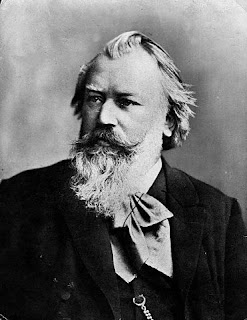Information
Composer: Johannes Brahms
- Piano Quintet in F minor, Op. 34: I. Allegro non troppo
- Piano Quintet in F minor, Op. 34: II. Andante, un poco adagio
- Piano Quintet in F minor, Op. 34: III. Scherzo. Allegro
- Piano Quintet in F minor, Op. 34: IV. Poco sostenuto - Allegro non troppo - Presto non troppo
- String Quartet No. 2 in A minor, Op. 51 No. 2: I. Allegro non troppo
- String Quartet No. 2 in A minor, Op. 51 No. 2: II. Andante moderato
- String Quartet No. 2 in A minor, Op. 51 No. 2: III. Quasi menuetto, moderato - Allegro vivace
- String Quartet No. 2 in A minor, Op. 51 No. 2: IV. Allegro non assai
Stephen Hough, piano (1-4)
Takács Quartet
Edward Dusinberre, violin
Károly Schranz, violin
Geraldine Walther, viola
András Fejér, cello
Date: 2007
Label: Hyperion
http://www.hyperion-records.co.uk/dc.asp?dc=D_CDA67551
----------------------------------------------------------------------------
Review
A first-rate Brahms coupling finding both delicacy and fire in this music
In the Brahms Second Quartet the Takacs find a most appealing lightness of touch. They reveal anew the extraordinarily imaginative way in which the work begins, and breathe air into the intricate textures which precede the vacillating second theme. There’s an absolute unanimity to their playing, as there was in the Emerson’s recent set, but here I find a greater liveliness of approach. Compared to such groups as the Alban Berg, who revel in the lushness of Brahms’s writing, the Takacs are more febrile and transparent. Their third movement creeps in, skittering, but there’s no lack of sweetness of tone when required (such as in the glorious slow movement). And the fugal section has a spring in its step. Brahms isn’t all seriousness, they remind us.
The other major selling-point of this disc is the Piano Quintet, for which the Tak·cs are joined by Stephen Hough. This was also included in the Emerson’s set, with the distinguished American Leon Fleisher. I found that reading, though unquestionably beautifully wrought, a touch cosier than my benchmark – Maurizio Pollini’s Gramophone Award-winning reading with the Quartetto Italiano. But there’s nothing cosy about this latest reading, which has fire and passion aplenty, and the recording places Hough pleasingly within the overall texture rather than unduly spotlighting him. There’s a feeling of coming together of ideas, with these artists – masters of colour all of them – sparking off one another in a very unstudio-ish way. And throughout, Hough’s virtuosity makes light of Brahms’s unforgiving textures. If I still find Pollini and the Italianos (who offer no coupling) unrivalled in their soul-baring start to the finale, that’s not to say this new recording doesn’t deserve a place on the shelf alongside that classic reading.
-- Harriet Smith, Gramophone
More reviews:
http://www.musicweb-international.com/classrev/2007/Dec07/Brahms_Takacs_CDA67551.htm
http://www.musicalcriticism.com/recordings/cd-brahms-takacs-1107.shtml
http://www.allmusic.com/album/brahms-string-quartet-piano-quintet-mw0001874394
http://www.amazon.com/Brahms-String-Quartet-Piano-Quintet/dp/B000WE5G62
----------------------------------------------------------------------------
Johannes Brahms (7 May 1833 – 3 April 1897) was a German composer and pianist. In his lifetime, Brahms's popularity and influence were considerable. Brahms composed for symphony orchestra, chamber ensembles, piano, organ, and voice and chorus. Many of his works have become staples of the modern concert repertoire. An uncompromising perfectionist, Brahms destroyed some of his works and left others unpublished. Brahms is often considered both a traditionalist and an innovator. His music is firmly rooted in the structures and compositional techniques of the Classical masters, with a highly romantic nature embedded within.
https://en.wikipedia.org/wiki/Johannes_Brahms
https://en.wikipedia.org/wiki/Johannes_Brahms
***
Takács Quartet is a string quartet, founded in Hungary, and now based in Boulder, Colorado, United States. In 1975, four students at the Music Academy in Budapest, Gábor Takács-Nagy (first violin), Károly Schranz (second violin), Gábor Ormai (viola), and András Fejér (cello) formed The Takács Quartet. Current members include: Edward Dusinberre & Károly Schranz (violins), Geraldine Walther (viola), and András Fejér (cello). The quartet has recorded extensively for Decca and Hyperion, and has received several nominations and awards such as a Grammy Award and a Gramophone Award.
https://en.wikipedia.org/wiki/Tak%C3%A1cs_Quartet
https://en.wikipedia.org/wiki/Tak%C3%A1cs_Quartet
***
Stephen Hough (born 22 November 1961) is a British-born classical pianist, composer and writer. He has appeared as a soloist with major orchestras, as recitalist on the major stages, and as chamber musician with top musicians. He is also known for his various dazzling recordings of encore pieces and for championing lesser-known composers. His recordings (more than 50 of them) received multiple awards. As a composer, he has written over 30 published pieces, and often includes his own works in his recitals. As a writer, Hough has written about his homosexuality and its relationship with both his music-making and his religion.
http://en.wikipedia.org/wiki/Stephen_Hough
http://en.wikipedia.org/wiki/Stephen_Hough
----------------------------------------------------------------------------
FLAC, tracks
Links in comment
Enjoy!




This comment has been removed by the author.
ReplyDeleteThank you.
ReplyDeleteCopy Adfly (adf.ly/XXXXXX) or LinkShrink (linkshrink.net/XXXXXX) to your browser's address bar, wait 5 seconds, then click on 'Skip [This] Ad' (or 'Continue') (yellow button, top right).
ReplyDeleteIf Adfly or LinkShrink ask you to download anything, IGNORE them, only download from file hosting site (mega.nz).
If you encounter 'Bandwidth Limit Exceeded' problem, try to create a free account on MEGA.
MEGA
http://adf.ly/1NYaiM
booklet
https://www.hyperion-records.co.uk/notes/67551-B.pdf